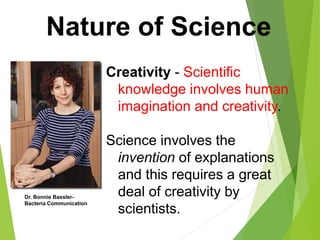Scientific inv and nature of science
- 1. Scientific Investigations & the Nature of Science
- 3. Types of Science Investigations Descriptive investigation: involves describing and/or quantifying parts of a natural or man-made system Comparative investigation: involves collecting data under different conditions (e.g., times of year, temperatures, locations) to make a comparison Experimental investigation: involves designing a fair test in which variables are actively manipulated, controlled, and measured in an effort to gather evidence to support or not support a causal relationship
- 4. Using a Science Investigation Observation Hypothesis Experiment Sample size Controls Constants Variables – independent and dependent (DRY MIX) Data Collection and Analysis Type of graphs, SI System (metric system) Retesting Placebo, blind studies, peer review Theories and Laws When hypotheses are confirmed through repeated scientific experiments Can be changed when more data becomes available
- 5. What do we believe? Who is reporting the information? Who conducted the research? Who paid for it? Is the report based on reputable research and repeated experimentation? CDC National Institute of Health WHO Is the report based on testimonials or personal experiences? Are the claims too good to be true?
- 6. Evaluating an Experiment A research group is studying the effect of energy drinks on the pulse rate of adolescents. Twenty five students were selected, ages 14-18. Each had their resting pulse rate measured and then consumed an energy drink such as Red Bull. After 1 hour, their pulse rate was tested again and compared to the original rate. Control: Constants: Independent Variables Dependent Variables: How could this experiment be improved? Would you trust the outcome of this experiment?
- 7. Evaluating an Experiment, sample 2 Miracle Gro ™ is developing a new form of fertilizer that is specific to helping tomato plants grow. They obtained 100 tomato plants to test their new fertilizer on. Each plant was watered daily with 10mL of water and placed in a greenhouse where it received the same amount of sun. Group A plants received 10mL of the fertilizer, Group B plants received 5mL of the fertilizer, and Group C plants received no fertilizer. Plant growth was measured for one month. Control: Constants: Independent Variables Dependent Variables: How could this experiment be improved? Would you trust the outcome of this experiment?
- 8. Review What are observations based on? What are hypothesis based on? Why should scientists always re-test? What is the point of a peer review? How do scientists come to conclusions? Why do good experiments need a control or placebo? How can uncontrolled variables lead to faulty data? Why does the U.S. spend billions of dollars each year on scientific research? Should they?
- 9. Nature of Science Empirical - Scientific knowledge is, at least partially, based on and/or derived from observations of the natural world Archaeopteryx Pangaea
- 10. Nature of Science Observations and Inferences: Observations are descriptive statements about natural phenomena that are “directly” accessible to the senses (or extensions of the senses). By contrast, inferences are statements about phenomena that are not “directly” accessible to the senses. Charles Darwin And “his” finches
- 11. Nature of Science Tentativeness – Scientific knowledge changes in two ways; it grows as new knowledge is discovered and improves as old knowledge is revised corrected. While scientific knowledge is tentative, there is also much reliability in scientific knowledge because of its empirical basis.
- 12. Nature of Science Social/Cultural Embeddedness - Science is practiced in the context of a larger culture and scientists are the product of that culture. Science is affected by the various elements of the culture in which it is embedded. These elements include social fabric, power structures, politics, socioeconomic factors, philosophy, and religion. Stem Cell Research & HPV Vaccine
- 13. Nature of Science Subjectivity - Scientific knowledge is subjective. Scientists’ theoretical commitments, beliefs, previous knowledge, training, experiences, and expectations actually influence their work. Scientists’ observations (and investigations) are always motivated and guided by, and acquire meaning in reference to questions or problems. H. pylori Drs. Barry Marshall & Robin Warren
- 14. Nature of Science Creativity - Scientific knowledge involves human imagination and creativity. Science involves the invention of explanations and this requires a great deal of creativity by scientists. Dr. Bonnie Bassler- Bacteria Communication
- 15. Nature of Science Theories and Laws - Theories and laws are different kinds of knowledge; one can not develop or be transformed into the other. Laws are statements or descriptions of the relationships among observable phenomena (the “what”). Theories, by contrast, are inferred explanations for observable phenomena (the “how”).
- 16. Look at these two sets of animal tracks. List 3 OBSERVATIONS Make an INFERENCE
- 17. Now what do you think? Make 3 OBSERVATIONS Make an INFERENCE
- 18. Now what do you think? Make 3 OBSERVATIONS Make an INFERENCE


















